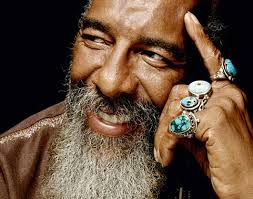Folk singer and activist Richie Havens, Blackfeet, died at his home in Jersey City, New Jersey, on April 22. He was 72 years old. Havens will always be remembered as the opening act at the Woodstock music festival in 1969.
 It wasn’t his scheduled slot at Woodstock, (the band Sweetwater was supposed to open), but because the highways were choked to a standstill with traffic, many of the other artists hadn’t arrived. Festival co-organizer Michael Lang gave Havens the task of taking the stage first, and holding it for as long as need be. “It had to be Richie – I knew he could handle it,” Lang later wrote, according to a Havens obituary at RollingStone.com.
It wasn’t his scheduled slot at Woodstock, (the band Sweetwater was supposed to open), but because the highways were choked to a standstill with traffic, many of the other artists hadn’t arrived. Festival co-organizer Michael Lang gave Havens the task of taking the stage first, and holding it for as long as need be. “It had to be Richie – I knew he could handle it,” Lang later wrote, according to a Havens obituary at RollingStone.com.
Richie Havens composed “Freedom” on the spot at Woodstock.
Havens gave a marathon performance that included numerous encores and an on-the-spot composition of what would become an anthem of the documentary film, and the era. As Havens recalled for CNN in 2009:
My band had made it up from Manhattan in the early morning hours, and we had the least amount of gear to set up, so after some strong convincing from the promoters I agreed to go on.
The show was late in starting, and they were feeling pressure to start the music. We played for nearly three hours as they were still building the stage around me. I sang every song I knew, and when they asked me to go back on one more time, I improvised “Freedom.”
When you see me in the movie tuning my guitar and strumming, I was actually trying to figure out what else I could possibly play! I looked out at all of those faces in front of me and the word “freedom” came to mind.
From “Freedom” he segued into “Motherless Child,” an old spiritual. His chants of “clap your hands” and the ecstatic response of the audience imbued the massive concert with the boisterous intimacy of a Greenwich Village hootenanny — fitting for a graduate of the New York City folk scene who’d frequently crossed paths with Bob Dylan. But unlike Dylan, who was born in Minnesota, Havens was born and raised in Brooklyn — a Native New Yorker.
He was also a Blackfeet Native American. He spoke of his heritage in an NPR interview in 2006:
 My mother’s family came from the British West Indies. And my father’s family came from, well, my father’s father came from the Montana/South Dakota area. They were Blackfeet Indian. My grandfather and his brother came with Buffalo Bill’s Wild West Show, got off in New York City, and left the show there and ended up on Shinnecock Reservation in Long Island. And he got married there, and moved to Brooklyn, and that’s how my father was born in Brooklyn. And how I ended up being born in Brooklyn as well.
My mother’s family came from the British West Indies. And my father’s family came from, well, my father’s father came from the Montana/South Dakota area. They were Blackfeet Indian. My grandfather and his brother came with Buffalo Bill’s Wild West Show, got off in New York City, and left the show there and ended up on Shinnecock Reservation in Long Island. And he got married there, and moved to Brooklyn, and that’s how my father was born in Brooklyn. And how I ended up being born in Brooklyn as well.
Havens hit Greenwich Village when he was 20, already a skilled vocalist, able painter, and aspiring beat poet. He scraped out a living painting portraits for tourists, and taught himself to play guitar; after two demo albums for Douglas Records, he signed on with Dylan’s manager, Albert Grossman, and released Mixed Bag in 1967. Mixed Bag, propelled by a version of Dylan’s “Just Like a Woman,” established Havens as a force in the folk scene, not only because of his remarkable voice but also his uniquely percussive style of guitar playing. Something Else Again followed in 1968, then the double album Richard P. Havens, 1983, in 1969.
Then Woodstock happened.
As it had been in that festival moment, Havens’ performance of “Freedom/Motherless Child” was also a tone-setter for the documentary film.
Not long after Woodstock, Havens’ career reached its commercial peak: Alarm Clock (1971) was his best-selling album, and contained his only top-20 single, a cover of George Harrison’s “Here Comes the Sun.” He continued to record and play live for another four decades, releasing his 21st studio album, Nobody Left to Crown, in 2008, and playing his final concert in 2012.
While many others who graced the Woodstock stage sold a lot more records than Havens, his was the quintessential Woodstock moment. Woodstock made him a beloved icon, and he used that iconic status for good, for the rest of his life. “I’m not in show business,” he once said, according to a profile at Biography.com, “I’m in the communications business.” He received the Peace Abbey Courage of Conscience Award in 1991, performed at Bill Clinton’s 1993 Inauguration, and played the Tibetan Freedom Concert in 1999.
He advocated for environmental causes, and founded a children’s oceanographic museum, the Northwing Undersea Institute, in the Bronx, which spawned the Natural Guard, an organization for teaching kids about the environment. On his website, RichieHavens.com, the brief message announcing his passing notes that he died on Earth Day.
Richie Havens played a key role in establishing the Native American Music Awards.
 Another cause near to Havens’ heart was the music of American Indians, his father’s people. He helped advance the unity and visibility of Native recording and performing artists by playing a key role in the establishment of the Native American Music Awards.
Another cause near to Havens’ heart was the music of American Indians, his father’s people. He helped advance the unity and visibility of Native recording and performing artists by playing a key role in the establishment of the Native American Music Awards.
“Richie Havens offered his support and commitment as a performer with Blackfoot Indian heritage during the formation of the Native American Music Awards,” the organization said in a statement. “He proclaimed his Native American heritage at a press conference announcing the launch of the Native American Music Awards in lower Manhattan on April 22, 1998, exactly 15 years ago.
Havens was also asked by the family of the late Jimi Hendrix to perform a musical tribute for Hendrix’s induction into the N.A.M.A. Hall of Fame at the First Awards ceremony held in May 1998 at the Foxwoods Resort & Casino.”
NAMA President and founder Ellen Bello recalls that Havens’ rendition of “All Along The Watchtower,” played as part of the Hendrix tribute, “catapulted the Awards show into something truly spiritual and spectacular.”